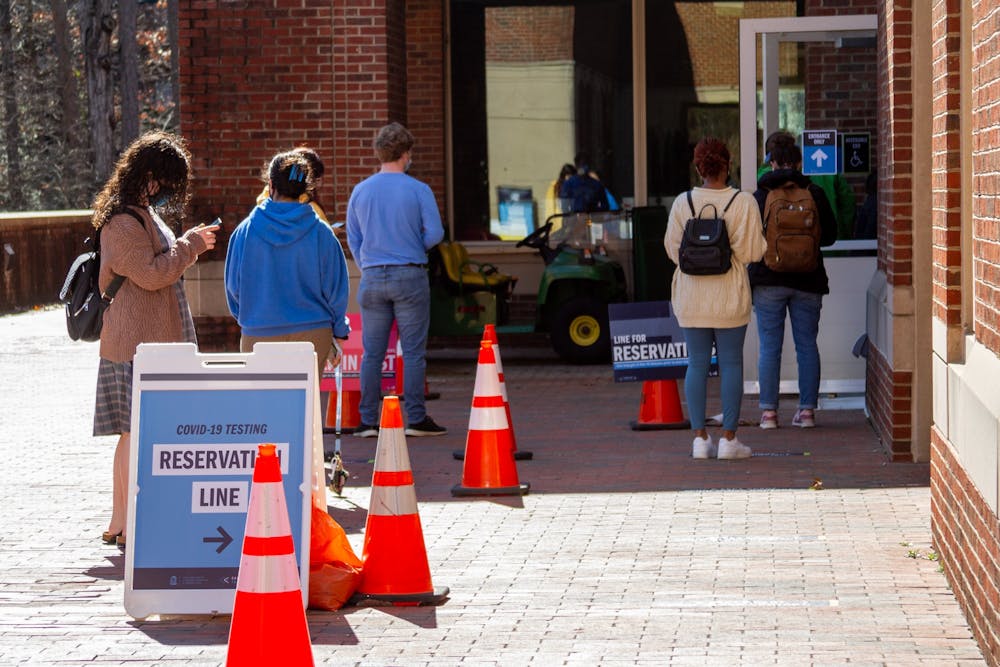That number doesn’t account for those living off-campus. But Media Relations said approximately 17,000 students are living in Chapel Hill and Carrboro this spring term.
Carolina Housing Executive Director Allan Blattner said UNC consulted with infectious disease and public health experts when making their decision to allow students on campus, and requires that on-campus students test for COVID-19 twice a week to prevent viral spread.
Carolina Housing only provided single-occupancy housing units for students this semester, increased isolation and quarantine room capacities and suspended residential hall visitation until further notice. Violations of these standards could result in the loss of students' housing contracts for the rest of the academic year.
“We hope these efforts helped students feel confident in their decision to live on campus,” Blattner said in the statement.
Behind the decision to return
One of the reasons Reynolds wanted to be on campus was to be around other UNC students.
Back home, she said, she found it hard to focus on her assignments or study for exams. Sometimes she would only watch part of her content review videos for class to answer a short forum post or attend early morning Zoom classes from the comfort of her bed while half asleep.
“I'm definitely guilty of, like, just falling asleep in my classes,” Reynolds said.
Leonardo Bonilla, a junior studying biology, also said he felt distracted while living at home in Winston-Salem last fall. He was forced to move back home in late August after living at Connor Residence Hall for two weeks.
At home, Bonilla not only took care of himself but his parents and younger brother as well. Several times during the week, he cooked them dinner, washed the dishes and walked their chickens outside to ensure they produced enough eggs.
He said he juggled roughly three to four hours worth of chores and familial responsibilities — all on top of six UNC classes.
Bonilla was confined to the four walls of his bedroom when it came time to attend Zoom classes, do homework or study for exams. As the semester droned on, he was constantly working on assignments and found it hard to take a break.
To get the day's news and headlines in your inbox each morning, sign up for our email newsletters.
“I was dealing with a bigger time crunch during the semester and constantly doing work,” Bonilla said.
The stress made it hard for him to stay motivated.
“I barely left my room,” Bonilla said. “I started resenting my own room.”
Bonilla said he knew it was time to move back to Chapel Hill when the background noise of being at home became too much. Sometimes he would accidentally unmute his mic during class, where his classmates could hear his father cursing in Spanish or his 5-month-old dog, Marigold, barking at the top of his lungs across their house.
Starting in mid-October, he said, he began making plans to move off-campus, and he now lives with three suitemates.
Lack of trust
Although he preferred to move back onto campus, Bonilla said it’s difficult to trust UNC after being forced to leave campus last fall. He also doesn’t trust being around other students who might not follow safety and health guidelines.
“I’m trusting other people around us who don't really completely understand what's going on and have a blatant disregard for the virus,” Bonilla said.
One of the incidents he referred to was the Franklin Street rush. He said knowing students congregated in tight spaces, many of whom didn’t put on a mask, was deeply concerning to him.
“There’s a lot of cursing involved in that conversation,” Bonilla said.
Guskiewicz said at the Feb. 19 meeting that the campus positivity rate since the rush is less than 0.4 percent, with nearly 70,000 tests conducted.
“All indications are that it’s going well and that it’s been great getting out from behind the Zoom screen for those who are able to do it, which is extremely important,” Guskiewicz said at the meeting. “We look forward and look toward establishing normal campus operations for the fall 2021 semester.”
For first-year neuroscience student Rashika Rahman, moving to Chapel Hill meant feeling connected to the school that was more than 300 miles away from her last fall.
She said she spent her first semester as a neuroscience major living in her hometown of Baltimore, Maryland. Now, she is taking an ECON 101 honors course in person this spring term.
Rahman initially planned to move into Hinton James Residence Hall in the fall, but made the decision to stay home a week before the semester began. She grew concerned about the possibility of contracting COVID-19 after she was matched with eight roommates in a single suite and wasn’t required to test before coming onto campus.
“There were a lot of people to trust, and it would be strangers that I would be trusting as well,” Rahman said. “I didn't know anybody too well, and I didn’t know what they were doing or how they handled COVID.”
But she ultimately decided to live at Hinton James this spring in a single suite to stay safe. Rahman said it was important that she become familiar with the area and connect with classmates. But she sometimes does feel a sense of isolation because she is living by herself and doesn’t interact with many students on her floor or dorm hall.
“I think (UNC is) doing a lot better with those regulations and proportions, so it's making me feel safer being on campus,” Rahman said.
@heidi_perez02
university@dailytarheel.com




